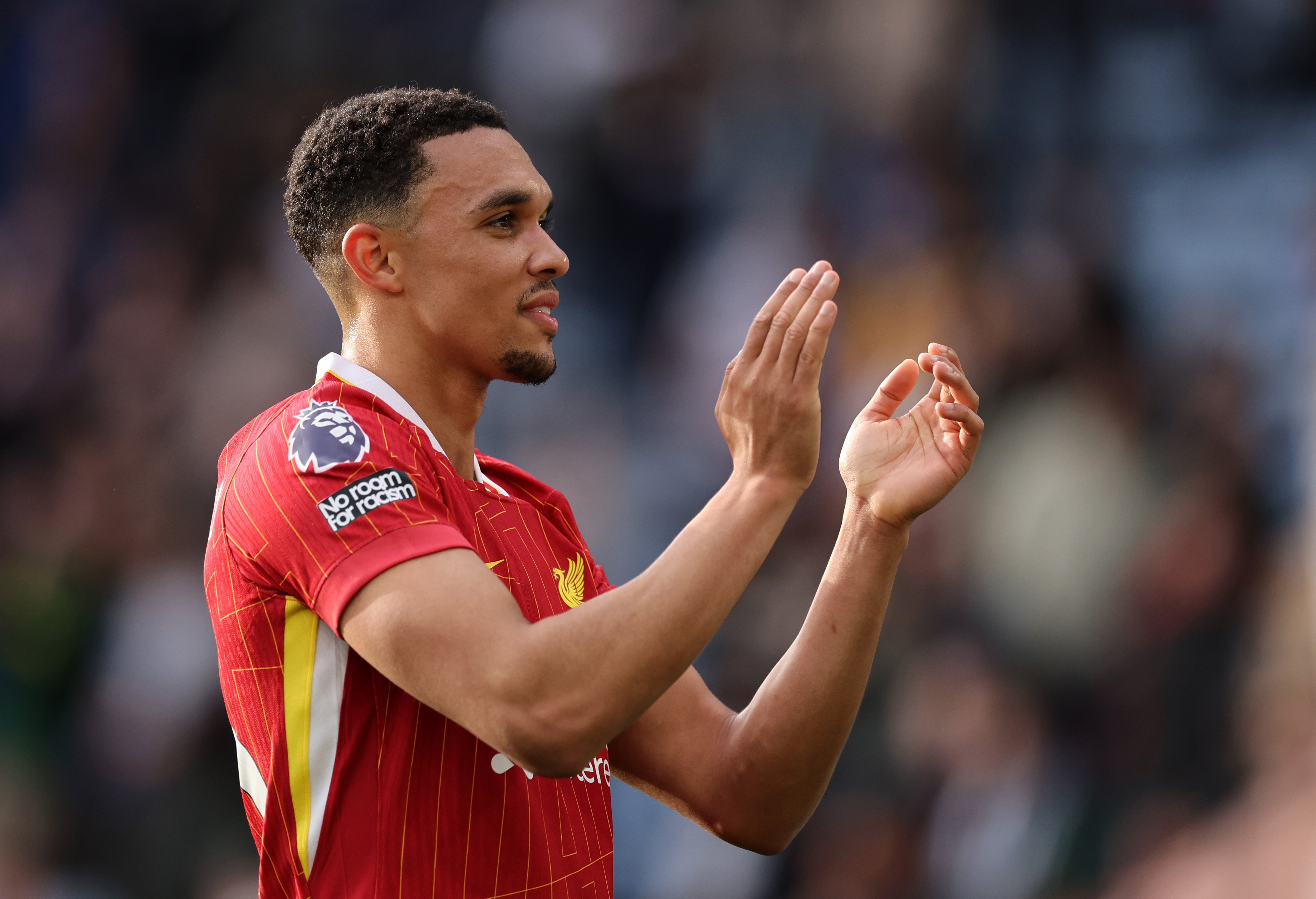Atletico Madrid, the Champions League's toughest team to beat? Meet Manchester United's biggest problem: Diego Simeone
The Argentine has performed miracles during his nine years at the helm, taking Atletico from 13th in La Liga to title winners and European trophies – now he bids for Champions League glory
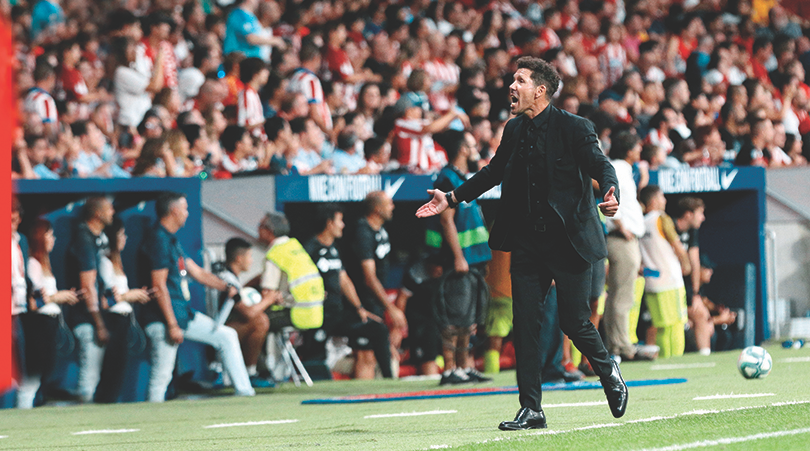
This article first appeared in the December 2019 issue of FourFourTwo. Subscribe to the mag - get your first five issues for just £5, almost £25 cheaper than buying it in the shops
Diego Simeone can smell the alcohol on Ariel Ortega’s breath. The River Plate boss knows that his captain hasn’t been to bed.
It’s 11am on Saturday June 22, 2008. In a little over 24 hours, River will conclude their title-winning Clausura campaign at Banfield’s Estadio Florencio Sola. The stadium will be full, not only to celebrate the legendary Javier Sanguinetti’s final game for the home side, but to witness Ortega lift the trophy in the centre circle.
El Burrito (‘The Little Donkey’) has already carried out that duty a fortnight earlier, when River wrapped up the league with a game to spare thanks to a 2-1 home win against Olimpo, but this is different. This is symbolic. Ortega will be ceremonially ending the 2007-08 Argentine football season.
But the River manager’s mind is already made up. His skipper and club idol can’t turn up drunk to training the day before a match, no matter how meaningless, and expect to play. Simeone will compromise, however, appreciating how instrumental the ageing playmaker has been in his team’s first title in four years.
“Ariel,” snaps Simeone, “I gave you the No.10 shirt and made you our leader, but you have to think about the team. Look at the state of you. You can’t play.”
“Cholo,” pleads Ortega, using his coach’s nickname, “don’t do this to me. We can talk about this tomorrow. Let me play. It’s the last game.”
Get FourFourTwo Newsletter
The best features, fun and footballing quizzes, straight to your inbox every week.
“No. No way. What I propose is that you come with us and go onto the pitch with the championship trophy. But you’ll be on the bench.”
“Please, don’t do this to me. Let me play.”
“Ariel, you’re in no fit f**king state! Besides, if I play you, I will create a bad precedent for the group. So, no. I’m sorry.”
“If I’m not playing, I’m not coming.”
“Then don’t come. I’ll go and tell the squad now.”
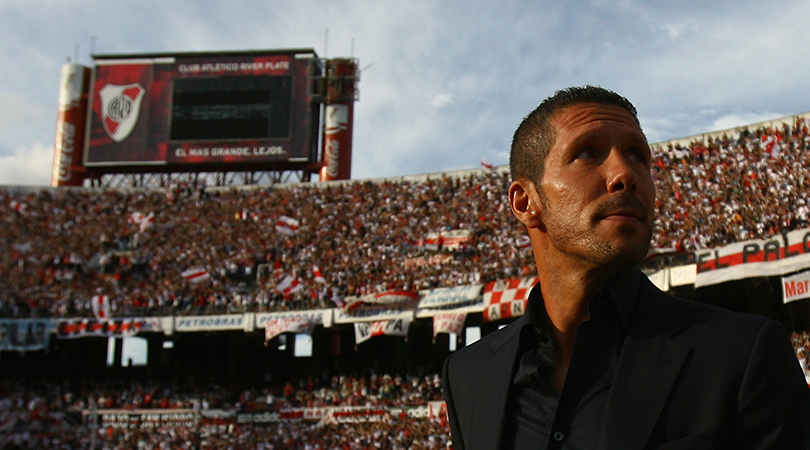
Three and a half years later, on Christmas Day 2011, an excited Diego Simeone walked through departures at Buenos Aires’ Ezeiza Airport. The Argentine was going home. To Atletico Madrid.
“I felt untouchable,” he recalled. “When I left [Atletico] in December 2004 as a player, I couldn’t stop crying. I didn’t want to go. But I knew that I had to leave on good terms before my contract was up, because I wanted to be back as a manager.
“Nothing else mattered. I knew it would go well for me. I sat in that seat on the flight convinced of it.”
Few shared that belief, however. The club Simeone rejoined was an underperforming mish-mash of battling identities, bereft of leadership. Atletico had just lost home and away to third-tier Albacete in the Copa del Rey and were 13th in the league, four points above the relegation zone, having won 18 of their 19 points at home.
Simeone was the unity candidate; a hugely driven midfield winner whose career at the Vicente Calderon had yielded a league and cup double in 1995-96 and, for his never-say-die attitude, the unswerving adoration of every Colchonero.
His appointment bought the board some breathing space. Here was somebody who bled red and white, who already had a firefighting reputation after saving both Racing Club and Catania from seemingly certain relegation in Argentina and Italy, and had won league titles at Estudiantes and River Plate.
“Welcome home – though you’ve never been away,” said a smiling Enrique Cerezo, Atleti president, at Simeone’s unveiling. “The fans still sing your name here. This is a happy day for all Atleticos, because your arrival as the new coach signals a new start for this club.”
Simeone’s work started immediately with an open session at the Calderon. After waving to the 7,000 fans chanting, “Ole, ole, ole, Cholo Simeone”, he called a huddle in the centre circle to outline his baseline – the bare minimum he expected from a talented squad low on confidence. “Chicos, el esfuerzo no se negocia,” he began. Lads, effort is non-negotiable.
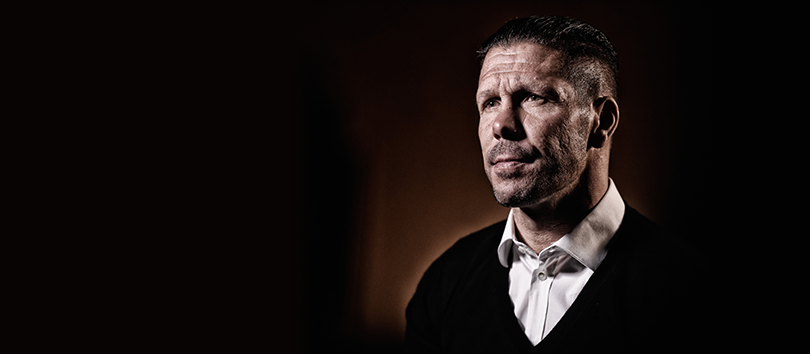
To implement that basic strategy – that Atleti would run further, faster and for longer than any other team – he had an ace in the hole. Uruguayan fitness trainer Oscar Ortega, nicknamed ‘Profe’ (Professor), has worked alongside Simeone at every club. The intensity of the 61-year-old’s sessions is legendary: few players survive without throwing up. Just as infamous are his matchday warm-ups, in which the phrase “¡quema el piso!” – “burn the floor!” – is repeated over and over through a series of sprints and ladder drills.
“Atletico were rich with talent, but for different reasons they weren’t able to perform,” Ortega (no relation to Ariel) later said. “Sometimes that happens. Things go badly, players get nervous. We arrived at that exact moment – a bad one, but knowing we had a good squad. Slowly we put our philosophy into action.”
There was more to the philosophy than just running; it wasn’t mere lung capacity that brought Atletico six clean sheets in Simeone’s first six matches. Simeone saw the quality that existed there: two strong centre-backs in Miranda and Diego Godin, dependable midfielders in Gabi and Mario Suarez, a young wideman in Adrian Lopez and a star centre-forward in Radamel Falcao. Those early weeks were all about focusing on these strengths.
“The good coach hides the weak parts of their team and brings their strengths to the fore,” said Simeone. “Sometimes players get frustrated in training because they think they’re not improving. Of course we’re trying to work on their weaknesses, too, but I want to make them feel good and focus on what they can do.”
What Simeone found was a strength of character that needed simple nurturing. He said, “I’ve found lads who are the essence of football; who want to win, to play, to compete; who get annoyed when they don’t. Even in training, they hate losing.
“You can say: ‘I want to play like Barcelona’. But we’re not Barcelona, and we never will be. People are obsessed with possession, but I don’t love it so much because it serves as a way for the opposition to get comfortable. Possession is good when it makes the opposition suffer with a change of rhythm.”
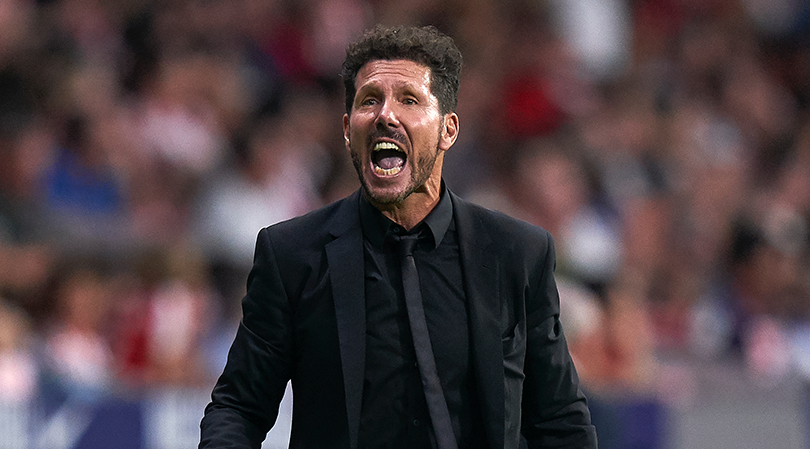
His side became focused on the collective; on taking advantage of space by attacking from deep; on never giving up.
“It must be about the team, not the individual,” he said. “How long does an individual have the ball at their feet in a game? Four minutes absolute maximum. And that’s for central midfielders. If the individual is accommodated and they can’t adapt, they’ll be of no use.
“That makes space so important. You spend the whole game looking to find it, to exploit it. We coaches have the ideas, but it’s the players who put them all into practice. The only difference between Simeone, [Carlo] Ancelotti, [Jose] Mourinho, [Pep] Guardiola and a guy working in the second division is experience.”
A competitive edge drives Simeone. Switching off is impossible. Inside the De Maria restaurant in Majadahonda – a favourite haunt since his mid-90s playing days, overlooking Atletico’s training ground in Madrid suburbia – not a meal goes by without him moving glasses around as if they’re players, pondering tactical adjustments to evolve his team. It’s the same when he watches a film, too. “You can be in a cinema,” the Argentine once confessed, “and all of a sudden, a move will come to you in front of your eyes, while you’re sat watching the screen. This has genuinely happened to me.
“I spend 25 hours a day, not 24, thinking about Atletico.”
Under Simeone, Atletico Madrid have won seven trophies. His first 12 months in charge brought the Europa League and UEFA Super Cup, then came the Copa del Rey, the remarkable La Liga triumph of 2014, the Supercopa de Espana, and the Europa League and UEFA Super Cup again in 2018. He has also guided the Rojiblancos to two Champions League finals – Real Madrid needed extra time to eventually see them off in 2014, and penalties in 2016 – as well as two runners-up finishes in La Liga, long considered to be a two-team title race with neither of those teams Atletico.
Inevitably, big-name vultures have circled all the while. A host of key cogs have left the club over the years: Thibaut Courtois, Diego Costa, Arda Turan, Antoine Griezmann and Falcao to name just five, even if Costa has since returned. Simeone sees this as an advantage, though, because it predicates a fresh injection in the playing squad.
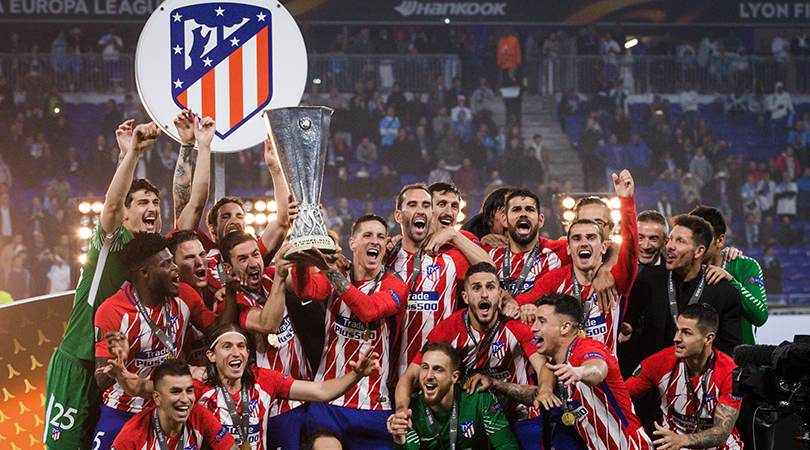
“Internal competition creates strength,” he has said. “It all depends on the directors, because if you don’t improve a squad, then things go wrong. It needs a new player, with an empty head I can fill, to inspire a player who’s played for me for four years to keep listening. Otherwise, they relax. I’m not talking about changing 10 players every season, but fresh faces serve to automatically renew your squad.”
Surgical upgrades (Jan Oblak, for example, or Joao Felix) arrived, but only to fit in the 4-4-2 system that has served Los Colchoneros so well under their Argentine coach. The strikers press high and the midfield four play narrow, allowing the full-backs to provide width. It’s all very Alex Ferguson. Similarly, Simeone has promoted from within – Koke, a lifelong Atletico fan, developed into one of Europe’s best midfielders.
“I still remember watching El Cholo from the Calderon’s stands as a kid,” Koke told FFT. “No chance did I ever imagine working under his orders as my coach.
“He’s a born winner. He’s turned us from a potentially great group, which had a lot of talented players but needed to work harder, into a team of winners. His efforts are unbelievable. You want to play well in every match, just to pay him back for what he brings to the club.”
Throughout the 1970s, anyone who passed the now semi-abandoned No.4876 Calle Costa Rica – a long, straight street in Palermo Viejo, to the north of downtown Buenos Aires – would have noticed the same thing: a small boy kicking a ball. Little has changed in Diego Simeone’s life in the intervening years.
“His personality marked him out as different,” recalled father Carlos, himself a former footballer. “Diego used to break my mum’s plant pots constantly until one day she got so furious, she hid his ball. What did he do? He found an old pair of tights, stuffed it full of paper and started playing with that instead.”
Even at school, young Diego couldn’t be parted from his first love: he once tied a different homemade ball around the base of his desk, so he could kick it throughout class without his teachers realising. One thing they had spotted, though, was how other pupils reacted to this totemic seven-year-old.
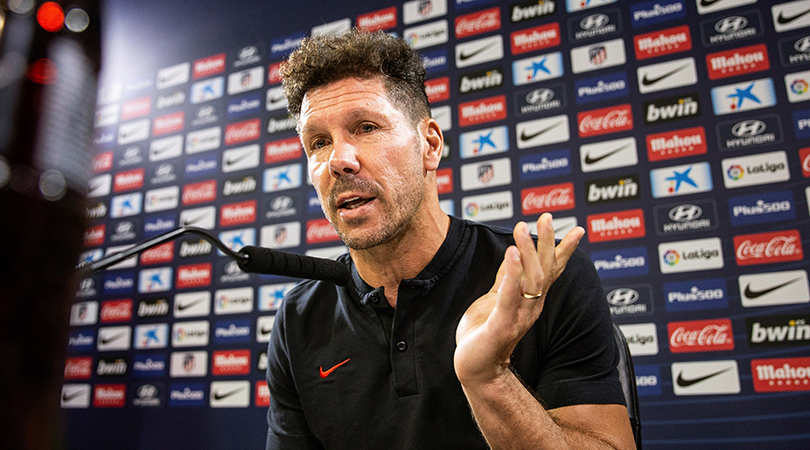
“I put together a school band of first- and second-year students,” revealed music teacher Bruno Amazino. “I made Diego the conductor, even though he couldn’t play an instrument. Everyone thought I was crazy, but he was a great success because he was a natural leader. He looked at the kids, saying, ‘Piano, drums, tambourine’. They followed.”
One of Amazino’s most treasured possessions is a framed photograph of a bolt-upright Simeone, baton in hand and wearing a pair of flared trousers, directing the school orchestra.
Such desire, innate football talent and an obsessive will to win soon alerted Velez Sarsfield, where Simeone gained the nickname ‘El Cholo’. He showed the same spirit, desire and energy as no-relation namesake Carmelo, a legendary defender for Boca Juniors in the 1960s, and so acquired his epithet. Throwing a ball onto the pitch as an 11-year-old ballboy to prevent a counter-attack in a 1982 Velez-Boca match also helped to establish the legend.
Nothing came between this new Cholo and football. When he and team-mate Antonio Mohamed missed the bus from the Argentine FA headquarters to an under-20s training session in Ezeiza, Simeone had a plan. The pair took the metro to Constitucion, got on the No.46 bus and then the No.91, but had no money left for the last fare.
“Look at this face,” Cholo barked, staring down the driver. “I will be a star. I will play for Argentina. We must get to Ezeiza. Please take us.” The driver went to the end of the line, but the duo were still 5km away. At Simeone’s insistence, they ran, arriving just before training finished. Subscribing to former Argentina boss Carlos Bilardo’s Machiavellian principles that the footballing ends always justify the means, Simeone did anything to win. Just ask David Beckham, whom Simeone ensured would be sent off at France 98 for the lightest of kicks.
Simeone has always summed up such skulduggery as being part of the game. During a 1994 match between Barça and Atletico, Brazilian striker Romario punched him in the head and duly received a red card. Simeone’s reaction? “I’d been at him all game – if you f**k someone off, they’re within their rights to smack you.”
It might not seem like it – Simeone famously describes his playing style as that of a man “holding a knife between his teeth”. However, El Cholo always knew the line, and his coaches appreciated having an on-field coach respected by all.
“With 11 Simeones, I would have toured the world without losing a game,” Francisco Maturana, briefly Atleti coach in 1994, proclaimed to FFT. “Once, I tried to explain a tactical idea and no one understood. Frustrated, Cholo stood up and shouted, ‘Look, if anyone doesn’t get this, then they should f**k off and play street football.’ Suddenly, they all concentrated and did exactly as I asked. Any manager dreams of having such a player.”
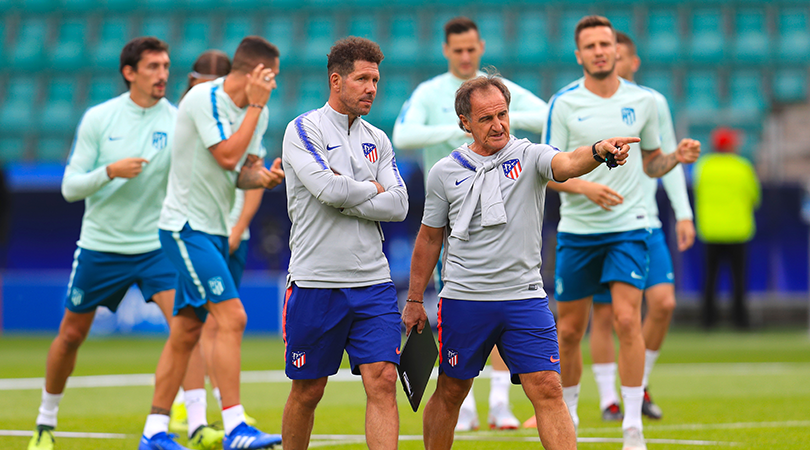
By the time he’d gone back to boyhood team Racing Club in 2004, via a UEFA Cup-winning spell with Inter, double-winning spell at Lazio and a brief return to Atletico, Argentina’s then-record appearance-holder knew he was nearing the end. But he couldn’t give up football.
On February 17, 2006, Simeone went to bed as a Racing player. He awoke as their manager.
“It was my decision,” Simeone would later reflect. “I didn’t need to do this, but I understood what I can and can’t do. I read the game, so I took the job.”
Racing’s hopes were bleak. Simeone took the reins with the strugglers having picked up a single point from their opening five fixtures of the campaign. “Friday, he was a team-mate,” left-back Carlos Arano told FFT, “and Saturday, he was our manager. It was a brave decision. Many managers wouldn’t have dared to accept the team in such conditions, and it was strange to begin with – it was like a rollercoaster that just kept going down and down.”
Racing lost their first three games under Simeone, conceding eight goals and scoring none. Eight weeks into a 19-match campaign, they still had only one point. Their 35-year-old manager spent hours rolling an apple around a table at the training ground, searching for answers with assistant Nelson Vivas.
The masterstroke came with seven games remaining when Simeone locked the squad in a hotel and refused to let them go home.
“Until we can’t reach our goal,” Diego told his drained squad, “which is to get out of the relegation zone, we won’t go back to our houses. We’ll be like a platoon in combat.” They won the Avellaneda derby at home to San Lorenzo, then recovered from back-to-back losses to win four successive matches, including a 2-0 victory at title-chasing River.
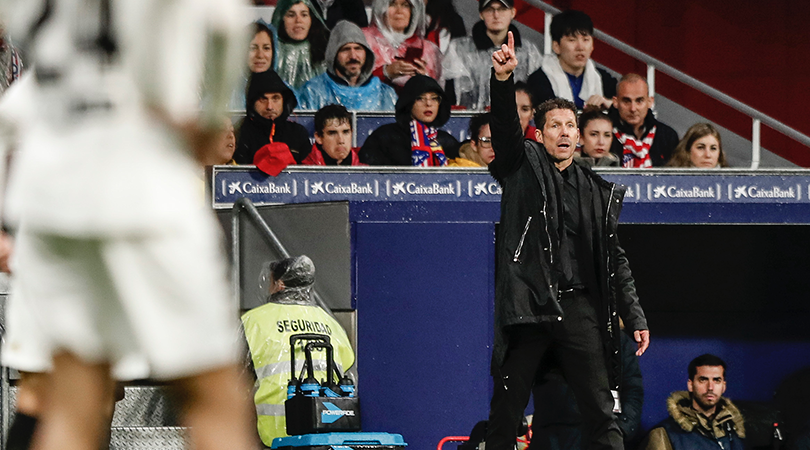
“El Cholo would tell us that crises must be understood,” says Arano. “Rather than pretend that they’re not there, it’s better to acknowledge them and take something out of them, because it’s in crises that you learn the most.”
That spell marked Simeone’s managerial psyche perhaps more than any other. Despite Racing’s survival and Diego’s own status as a club legend, a new president decided to appoint Reinaldo Merlo, who had led Racing to the Apertura title in 2001.
Simeone had already experienced management’s cut-throat nature and realised that to succeed, the knife clasped between his teeth as a player had to remain. Racing may not have appreciated the natural born leader in their midst, but three-time Copa Libertadores winners Estudiantes certainly did. One night at 10pm, Simeone got a call from the Rat Stabbers’ president Eduardo Abadie, suggesting a meeting at the training ground the following day.
“Why don’t we meet right now?” responded Simeone, who had been unemployed for all of two days.
Pragmatism soon took over. Despite exchanging barely more than perfunctory greetings with Juan Sebastian Veron as a player – they were Lazio and Argentina team-mates – Simeone built his Estudiantes side around the former Manchester United playmaker, appreciating the experience and big-game temperament of La Brujita (‘The Little Witch’). By the end of the 2006-07 Apertura, Simeone would need it.
For the first time in Argentine football history, the league would be decided by a play-off, as Estudiantes and Boca Juniors finished level on 44 points. To inspire his players to one final great achievement – Estudiantes had already tied the club record of 10 consecutive league wins – Simeone recited Al Pacino’s famous monologue from Any Given Sunday in the dressing room.
Now, what are you gonna do? Go 1-0 down after five minutes, then fight for each other, inch by inch, and win 2-1 with a Mariano Pavone header nine minutes from time – that’s what. It was Estudiantes’ first league title in 23 years.
Simeone was the hottest property in Argentina. Twelve months later, in December 2007, he succeeded Daniel Passarella in the River Plate dugout. For the only time in his career, El Cholo went on the offensive, playing a fluid 3-3-1-3 formation to give playmaker Ariel Ortega total creative freedom, while also playing promising youngsters Radamel Falcao and Alexis Sanchez. River won the 2008 Clausura by four points from eternal rivals Boca.
From there, after falling out with an increasingly erratic Ortega and the press, Simeone the firefighter returned, securing survival for San Lorenzo in 2010, Catania in Italy and finally back at Racing in the 2011 Apertura. The latter spell helped him exorcise his first coaching ghost.
In December, it was Simeone who departed Racing, not the other way around, and got on that Christmas Day plane to Madrid.
“The time has come,” Simeone explained to his father, Carlos, as he left for Atletico. Emboldened by a sense of destiny, he knew that the opportunity might never come up again. A nomadic five-year, six-club coaching career had been building to this moment, his apprenticeship of different clubs in different countries with their changing dynamics acting as the perfect teaching ground.
He had learned to delegate to his backroom team. He had learned that talking to his three children “for two minutes each before every game makes me feel like a normal person again”. He had learned how to motivate. Simeone belonged at Atletico, and he knew it.
The cult of Cholismo – the art of his inspirational man management – was unleashed at “mentally sunk” Atletico. Players play for him like no other. No longer would they be El Pupas (‘The Jinxed Ones’, for their record of losing in finals), because Simeone convinced his team to be winners. Falcao ran the length of the pitch to give Simeone his Europa League-winning shirt after a 3-0 win over Athletic Bilbao in Bucharest, because his boss had asked for a memento.
A year later, Los Colchoneros ended a 14-year losing streak against Real Madrid by winning the Copa del Rey at the Bernabeu.
“Under him, we were no longer the down-on-our luck Atleti of years gone by,” Koke told FFT. “‘Pupas’, people used to call us, which means ‘unlucky’. He changed our mentality. We now go out to win – he has instilled that into us. That’s the difference.”
Creencia, the Spanish call it. Belief. Atletico’s La Liga-winning squad of 2013-14 was determined by it. Throughout the campaign, Simeone the master orator varied his team talks. On the flight to Bilbao to face Athletic, he took someone along for company.
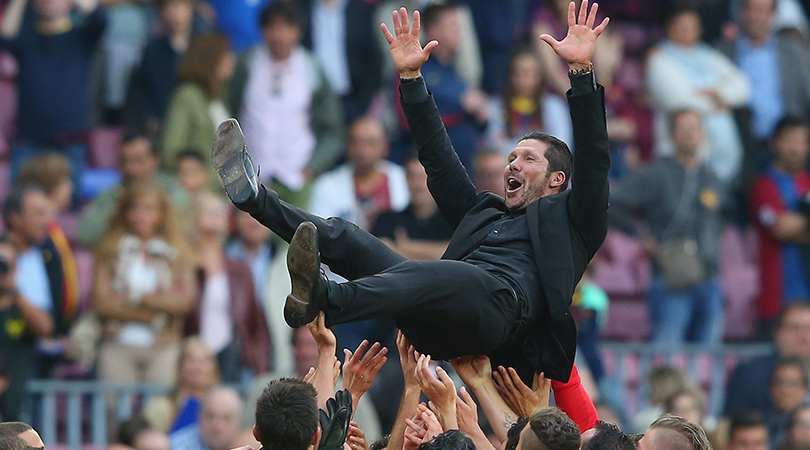
“Winning is very close to losing,” the guest speaker informed a visibly moved squad, “but never stop fighting. Life can strike you down a lot, but you have to dust yourself off, learn how to deal with success and adversity, and fight every day of your life.”
Nearly 23 years earlier, Irene Villa lost both of her legs when Basque terrorist group ETA exploded a bomb beside her car. Her injuries were so severe, her father asked doctors to let his daughter die. Atletico won 2-1, fighting back from a sixth-minute Iker Muniain goal.
The denouement to that unforgettable season, however, was pure Simeone. Atletico had been four points clear with three games to go, the title seemingly in their hands after a run of nine consecutive wins with just one goal conceded (and only 14 scored). However, not used to being the favourites, Atleti’s players got tight, like a tennis player at match point. They lost 2-0 at Levante, then drew 1-1 against Malaga. Now they had to go to the Camp Nou on the final day and get a result, or Barcelona would win the title. It was perfect for Simeone.
“Their pitch, to win their title, in front of their fans. Then you’re not expected to win. You can’t win.” That’s how Simeone later reflected on his side’s uphill task, which only got worse when Diego Costa and Arda Turan suffered first-half injuries and Alexis Sanchez put Barça 1-0 up.
“The last five minutes of that half, we had two crosses into the box,” he continued. “Not chances, but possibilities. I was walking back to the dressing room at half-time with German [Burgos, his assistant] and we were like, ‘We’re OK here’. If we scored, I knew Barça were finished.”
Dressed in his trademark black suit, the Argentine promptly delivered his Damascene intervention: dispassionate words of reason, clinical, almost in the mould of Don Corleone.
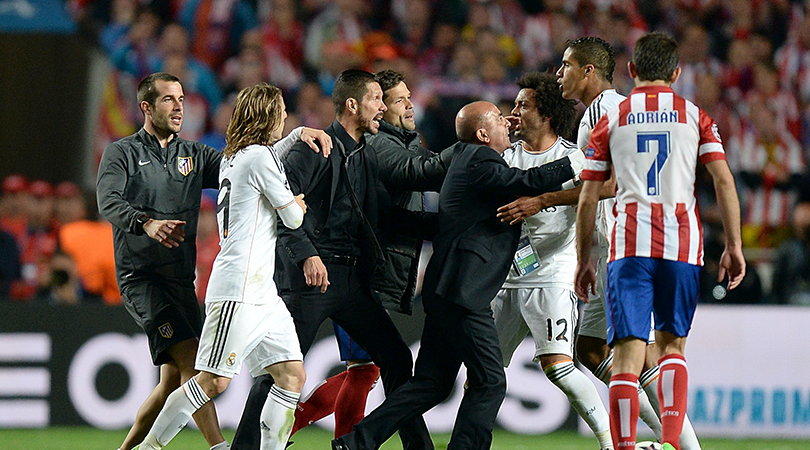
“Cholo simply told us to continue working exactly as we had been,” Koke recalled of the team talk that followed. “He never doubted us or the game plan for a second. He told us, ‘Keep believing in yourselves. I know you are going to score.’”
Four minutes into the second half, Uruguayan defender Diego Godin buried a header into the Barcelona net and Diego Simeone’s Atletico Madrid held on for the most unthinkable La Liga triumph.
True, there have been Champions League final defeats to old enemy Real Madrid since then – in 2014 and 2016 – but there have also been victories in the 2018 Europa League Final and UEFA Super Cup. Atleti have finished runners-up in the last two seasons. Without Simeone in charge, all of it would have been impossible; indeed, even reaching the Champions League knockout stages would seem beyond them. This has been institutional change on a grand scale.
“I don’t know what ‘pupas’ means,” Simeone has said of those two Champions League final defeats in Lisbon and Milan. “In my dictionary, ‘effort’ is a key word. Anything else, I don’t have time for, because I’ve never felt it. I only ever look forward, never back.”
This summer was a case in point. Godin, Griezmann, Juanfran and Filipe Luis – four central Simeone pillars – all left, and only Griezmann commanded a transfer fee by joining Barça for €120 million. Captain Koke is the sole survivor from that first great Simeone side of five years ago, with Diego Costa lifting two Premier League titles at Chelsea in between. Saul Niguez, Jose Gimenez and €126m addition Joao Felix, among others, have rejuvenated a squad that needed to evolve.
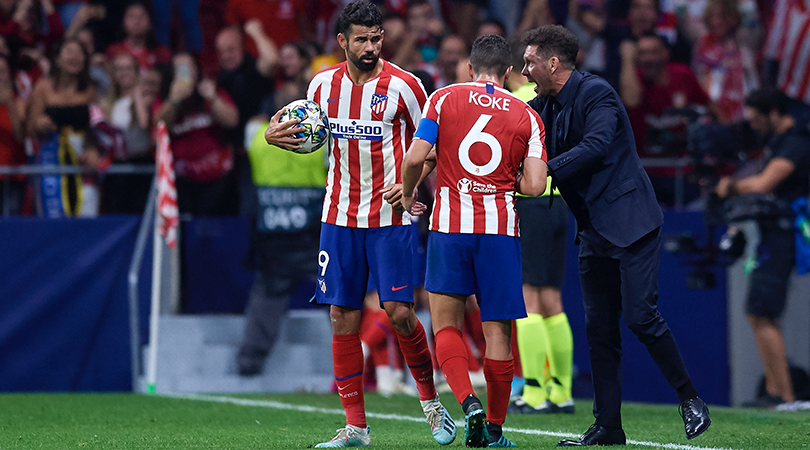
That Cholo has done so almost without anyone noticing has echoes of football’s other great emperor, Alex Ferguson. Just over four months after stopping skipper Ariel Ortega from taking to the field for River Plate’s valedictory celebrations back in June 2008, Diego Simeone resigned.
Unable to accept Ortega’s transgressions – which included crashing into a petrol station while drunk – he sent his captain out on loan to second-tier side Independiente Rivadavia, precipitating the beginning of the end. Neither River nor the press agreed with the decision.
Without fresh blood, so essential for Simeone’s system to work, the players relaxed. By November, Los Millonarios were without a victory in a club-record 12 games and bottom of the league with five matches of the season left. Hounded by the press, a haunted Simeone walked into, then straight out of, what would prove his final press conference, saying, “I feel a bit strange. Thanks. I’ll see you.”
Yet even with hindsight, he would change almost nothing about his handling of an Ortega situation that ultimately cost him his job. “It’s very easy to say we should have done this or that – that Ortega should have stayed in the squad with privileges – but Diego knew that the group was more important than any individual player,” Simeone’s assistant Nelson Vivas, the former Arsenal defender, told FFT. “After that, things went badly for us. His only regret is leaving River before the end of the season. He quit before the end of the season and was very sorry about that.”
In short, Simeone couldn’t forgive himself for leaving River – who would finish the campaign bottom for the first and only time in their history – with unfinished business. He swore he’d never do so again. In 2016, an exit from Atletico Madrid looked inevitable. He admitted that a Premier League position would be “very attractive”. Managing Atletico, completely bending the club’s infrastructure to his will, had visibly aged him, the face increasingly craggy and pockmarked, even if his hair remained jet-black. And he wasn’t short of offers. Arsenal were in contact when sounding out candidates to succeed Arsene Wenger; Manchester United and Inter made enquiries and Paris Saint-Germain would have happily made Simeone’s bank account look even brighter. Yet, helped by a new contract to make him the highest-paid coach in the world, Simeone kept that promise he had made to himself at River 11 years ago. He and Atletico had unfinished business. He would not leave without winning the Champions League. He could not bear anyone else managing them in the club’s final season at the Vicente Calderon, or their first one at the Wanda Metropolitano in 2017-18. He must not move on before refreshing the team he had built.
His sense of belonging was too strong – the Spanish call it esencia. “We’re a family,” Simeone has said. “We go to the death; my lads don’t fear death. I feel like I’ve been with these players my whole life. I know the people love the club. The players do. It makes the atmosphere feel all-encompassing – inclusive. You feel that esencia.” And if you don’t understand that, you don’t understand the fire that burns inside Diego Pablo Simeone – not merely one of the best coaches in the world, but one of the finest of the decade.’’
Subscribe to FourFourTwo today and save over a third on shop price
Restock your kit bag with the best deals for footballers on Amazon right now
ALSO READ
DECISIONS, DECISIONS What are Marcus Rashford's options if he does leave Manchester United?
PACKED BAGS Which players will leave Manchester United? 10 players who could be off before next season
Andrew Murray is a freelance journalist, who regularly contributes to both the FourFourTwo magazine and website. Formerly a senior staff writer at FFT and a fluent Spanish speaker, he has interviewed major names such as Virgil van Dijk, Mohamed Salah, Sergio Aguero and Xavi. He was also named PPA New Consumer Journalist of the Year 2015.
